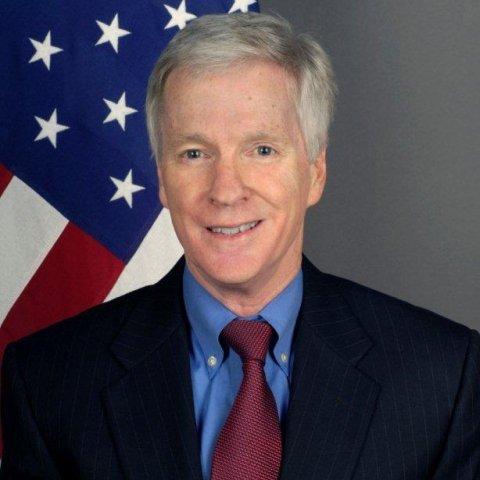The Georgetown University Master of Science in Foreign Service program hosted former U.S. Ambassador Ryan Crocker on Feb. 22 for a discussion on a career in diplomacy and current events in global affairs.
The event was moderated by Paul Miller, a School of Foreign Service professor of the practice of international affairs. Crocker, a decorated career foreign service officer who received the Presidential Medal of Freedom in 2009, discussed his experience as U.S. ambassador to six Middle Eastern countries under former U.S. Presidents George H. W. Bush, Bill Clinton, George W. Bush and Barack Obama.
Crocker served as U.S. ambassador to Lebanon from 1990 to 1993; ambassador to Kuwait from 1994 to 1997; ambassador to Syria from 1999 to 2001; ambassador to Pakistan from 2004 to 2007; ambassador to Iraq from 2007 to 2009; and ambassador to Afghanistan from 2011 to 2012.
Crocker spent his childhood traveling around the world as the son of a career officer of the U.S. Air Force. Crocker’s experiences visiting the Middle East inspired him to join the foreign service in 1972.
“I had the opportunity to visit Jordan, Israel, Lebanon, with my parents and just fell in love with it. Just something about it. It just grabbed me,” Crocker said. “Fascinating part of the world. I’ve gotta figure out a way to get back to it at some point.”
Crocker served mainly in the Middle East after joining the foreign service — including as a staffer in Lebanon when jihadi militants set off a suicide car bomb outside the U.S. embassy in 1983, killing 63 — and said he adapted quickly to these wartime environments.
“Danger, per se, was never that big of an issue for me,” Crocker said. “You do responsible things, of course, not to get gratuitously killed. Creates a lot of paperwork, but beyond that, I discovered I actually liked it.”
“Time would seem to slow down. Things would become much clearer than they would without the artillery in the background,” Crocker added. “Either you have that gene or you don’t, and I guess I had it.”

Crocker said life as a foreign service officer has changed substantially since he joined, with families of officers often now unable to join them in posts abroad.
“Back in the olden days, an individual joined the foreign service who could have a reasonable expectation that she or he would travel to interesting places with family, the kids would have a wonderful educational experience studying in international schools and so forth,” Crocker said at the event. “That foreign service has changed a lot.”
Crocker said a knowledge of regional history and the perception of that history by locals is crucial for any aspiring foreign service officer to understand the countries in which they serve.
“I didn’t really know much history. Most of us don’t in America. We’re not about yesterday, and we’re about today and tomorrow. That’s how we build our country,” Crocker said.
Although the United States has typically been active politically and militarily in the Middle East and Central Asia, recent years have seen U.S. presidents take a more passive role in Middle Eastern and Central Asian affairs — culminating in President Joe Biden’s decision to pull U.S. troops out of Afghanistan in 2021.
“I would say that acceptance and assertion of a global leadership role by the United States has now been increasingly called into question, not so much by potential international rivals, but by our own population and our own leaders,” Crocker said.
As a veteran diplomat and expert on Middle East affairs, Crocker said U.S. leaders need to readopt a more active policy toward the region.
“My view of the Middle East and where it was and where it’s going has a lot to do with, frankly, what we decide to do as Americans, whether we are still ready and able to play the principal external role in the Middle East, which is what we have done since the end of World War II,” Crocker said.
Crocker said Biden’s foreign policy choices regarding the war in Ukraine set an example for strategies that the United States should be pursuing in the Middle East.
“He’s pretty much got it as right as you could ever hope,” Crocker said. “Hours and hours and hours spent with the European Union, with NATO, with others, doing whatever it took to send the signal that the U.S. is, in fact, back. We are ready and able to stand up for global peace of security, and we can still rally a very strong alliance to support us in this.”
Crocker said there is a long-term need for U.S. leaders to exercise careful judgment in every decision in an age of foreign policy insecurity.
“Your major actions, whether to intervene or to disengage, carry with them not just third and fourth order consequences, but 40th and 50th order consequences that you cannot maybe even imagine,” Crocker said.





















